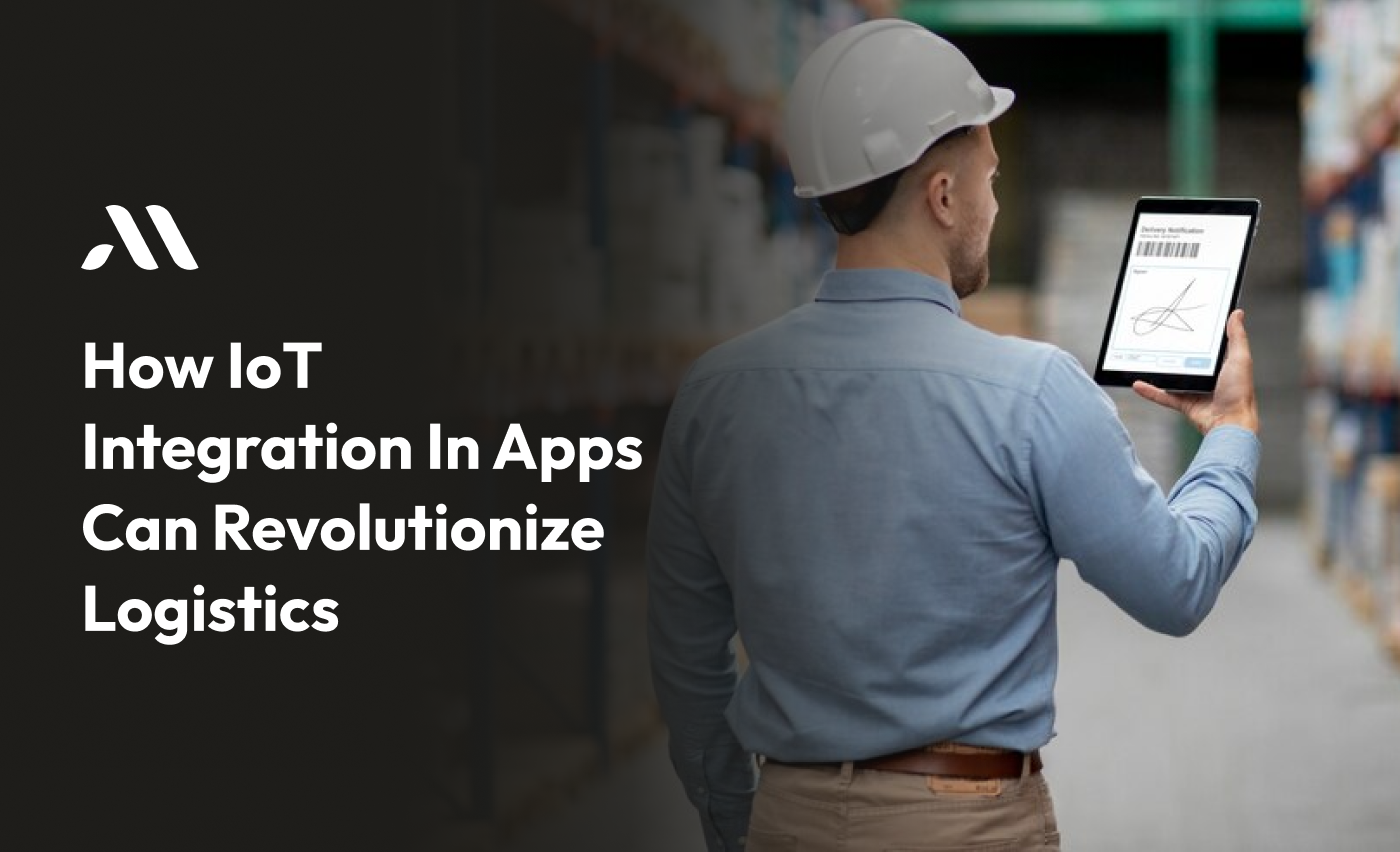The logistics industry is always changing, and new technologies are making things faster and easier. One of the biggest game-changers is IoT integration in apps. IoT stands for "Internet of Things," which means connecting physical devices like trucks, sensors, and warehouses to the Internet. These devices can share data, which helps logistics companies make better decisions, save time, and reduce costs. This article will explore how IoT integration in apps can completely change logistics.
- According to Gartner, over 25 billion IoT devices will be in use by 2025, with a large portion being used in logistics.
- A report by McKinsey shows that IoT integration in apps can improve supply chain efficiency by up to 50%.
- Statista predicts that the global IoT market in logistics will grow to $100 billion by 2027.
What is IoT Integration in Apps?
Before we jump in, let's break down what IoT integration in apps means. Imagine having a fleet of delivery trucks, each equipped with a sensor that tracks its location, fuel usage, and maintenance needs. These sensors send real-time information to a mobile app. The app collects and analyses the data, helping logistics managers monitor everything in one place. This is what IoT integration in apps does – it connects physical devices to apps for better control and decision-making.
Why Logistics Companies Need IoT Integration
For logistics-related business owners, staying competitive is crucial. Here's how IoT integration in apps can make a huge difference in logistics operations:
Real-Time Tracking of Goods
One of the biggest challenges in logistics is knowing where goods are at any given moment. With IoT integration in apps, companies can track shipments in real time. GPS trackers on trucks or shipping containers can send data to the app, showing exactly where the cargo is. This helps logistics managers ensure timely deliveries and avoid delays.
Better Fleet Management
Managing a fleet of vehicles is no easy task. IoT integration in apps makes it easier by providing real-time data about fuel consumption, vehicle health, and driver behaviour. This can help logistics companies reduce fuel costs and avoid unexpected breakdowns by scheduling timely maintenance.
Warehouse Optimization
Warehouses are the heart of logistics, and optimizing them can save time and money. With IoT integration in apps, sensors can track inventory levels, monitor temperature and humidity for sensitive goods, and even help with automated restocking. This helps ensure that warehouses run smoothly and that products are stored under the right conditions.
Improved Safety and Security
Safety is a top priority in logistics. With IoT integration in apps, sensors can be placed on trucks to monitor driver behaviour, like speeding or sudden braking. This helps reduce accidents. In warehouses, cameras and motion sensors can alert managers to any security issues, ensuring that goods are kept safe.
The Role of App Development in IoT Integration
To make all of this possible, companies need to work with an app development company that specializes in logistics solutions. These companies can create custom apps that suit the unique needs of logistics businesses. Whether it's tracking goods, managing fleets, or optimizing warehouses, the right app can make a big difference. A good app development company will ensure that the app is user-friendly, secure, and able to handle large amounts of data from IoT devices.
“The integration of IoT in apps is revolutionizing logistics, making processes faster, smarter, and more efficient.”
Remember: Security should be a top priority. As more devices get connected to the internet, they become potential targets for hackers. Work with your app development company to ensure that your app is secure.
Tips for Successful IoT Integration in Logistics Apps
If you're thinking about implementing IoT integration in apps for your logistics business, here are some tips to ensure success:
- Choose the Right Devices: Make sure the IoT devices you select, like sensors and trackers, are reliable and compatible with your app.
- Work with a Skilled App Development Company: Partner with an app development company that has experience in logistics and understands your business needs.
- Start Small: Begin with a pilot project before rolling out IoT integration across all operations. This will help you identify any potential issues early on.
- Prioritize Data Security: Since IoT integration in apps involves sensitive data, make sure your app has strong security features to protect against cyber threats.
- Use Cloud Technology: Cloud platforms can store and process large amounts of data collected from IoT devices, making it easier to analyze and use the data.
Key Benefits of IoT Integration in Apps for Logistics
Increased Efficiency
IoT integration in apps helps logistics companies run more efficiently by automating tasks and providing real-time information. For example, delivery routes can be optimized based on traffic data, reducing delays and fuel consumption.
Cost Savings
By reducing fuel costs, preventing breakdowns, and optimizing warehouse operations, IoT integration in apps can help logistics companies save money. A study by Business Insider shows that IoT in logistics can reduce operational costs by up to 30%.
Better Customer Experience
With real-time tracking and faster deliveries, customers are more satisfied. They can use apps to track their shipments, receive notifications about delivery times, and even provide feedback, improving the overall customer experience.
Data-Driven Decisions
IoT integration in apps gives logistics companies access to valuable data. This data can be used to make informed decisions, like when to schedule maintenance or how to improve delivery routes. Data-driven decisions lead to better business outcomes.
Also Read - Top App Development Trends Shaping the Logistics Industry in 2024
Real-Life Example of IoT in Logistics
Let's look at a real-life example. DHL, a global logistics company, has implemented IoT integration in apps to track its fleet and optimize warehouse operations. With the help of IoT devices and apps, DHL can monitor its vehicles, reducing fuel costs by 15% and cutting down on delivery delays by 20%. This has resulted in significant savings and improved customer satisfaction.
Remember: IoT technology is rapidly evolving, so it’s essential to keep your systems up to date. Regular updates and maintenance will ensure that your logistics operations stay efficient.
The Future of Logistics with IoT Integration in Apps
The future of logistics is bright with IoT integration in apps. As more businesses adopt this technology, we will see even more improvements in efficiency, cost savings, and customer satisfaction. Logistics companies that embrace IoT will have a competitive edge, delivering goods faster and more efficiently.
In conclusion, IoT integration in apps is revolutionizing the logistics industry. By working with the right app development company and using reliable IoT devices, logistics businesses can improve their operations and stay ahead of the competition.
"Accepting IoT technology in logistics is no longer an option – it's a necessity for staying competitive in the modern world."
Final Thoughts
If you are a logistics business owner, now is the time to explore IoT integration in apps. The benefits are clear – from real-time tracking and fleet management to cost savings and improved customer satisfaction. By partnering with an experienced app development company, you can ensure a smooth transition into this exciting new era of logistics.
Looking to revolutionize your logistics business with the power of IoT? MicraSol, a trusted app development company, can help you create custom apps that connect your devices, track shipments, and optimize operations. Contact us today and take the first step toward smarter, more efficient logistics!
FAQS
How does IoT help in logistics?
IoT integration in apps helps in logistics by providing real-time tracking of shipments, improving fleet management, and optimizing warehouses. It helps logistics businesses save time, reduce costs, and ensure safe deliveries.
Why should logistics companies use IoT integration in apps?
Logistics companies should use IoT integration in apps to make their operations more efficient. It helps track goods, manage fleets, and keep warehouses running smoothly. It also improves safety and customer satisfaction by providing real-time updates.
Can IoT integration in apps reduce costs for my logistics business?
Yes, IoT integration in apps can help reduce costs by cutting down fuel expenses, preventing vehicle breakdowns, and optimizing delivery routes. According to studies, it can reduce operational costs by up to 30%.
Do I need an app development company for IoT integration?
Yes, to make IoT integration in apps work for your logistics business, it’s best to partner with an experienced app development company. They will help build a custom app that fits your business needs and ensures all devices work together smoothly.
How does IoT integration improve fleet management?
With IoT integration in apps, sensors on vehicles can provide real-time data about their location, fuel consumption, and maintenance needs. This helps logistics managers monitor their fleets more effectively and avoid problems like breakdowns.








